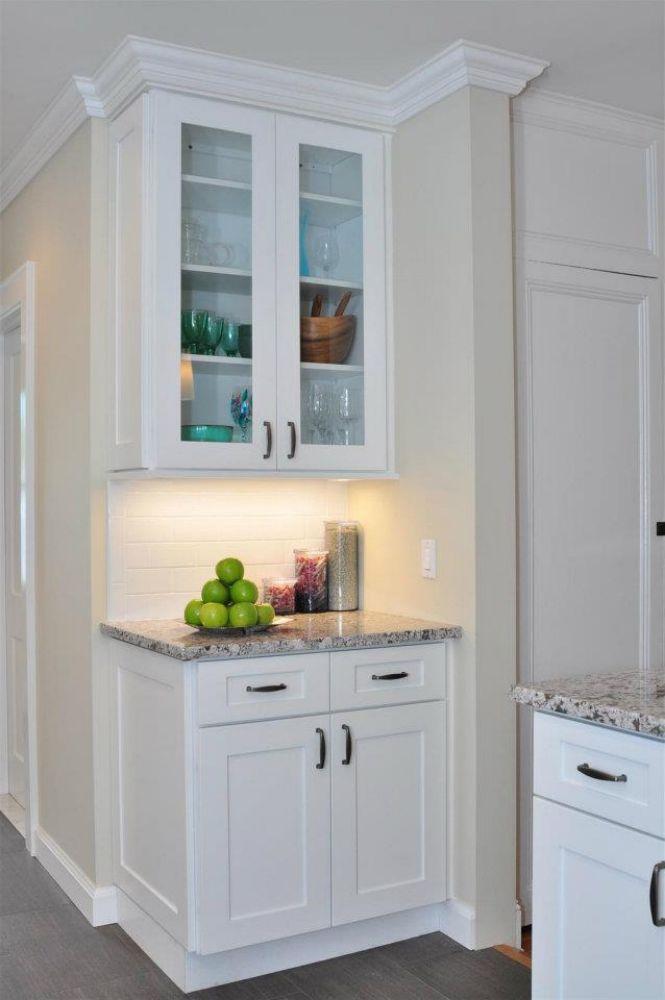Are The Materials In Forevermark Petit Blue Sustainably Sourced?
As sustainability becomes a leading concern for homeowners and builders, many are re-evaluating how their furniture and cabinetry choices impact the environment. Forevermark Cabinets, known for blending timeless design with modern responsibility, has received growing attention for its eco-conscious manufacturing practices. Among its most admired collections, the Forevermark Petit Blue line not only stands out for its serene blue-gray aesthetic but also raises the question: Are the materials used in these cabinets truly sustainably sourced?
In this article, we explore how Forevermark approaches sustainability, examining the materials, manufacturing processes, certifications, and practices that make Petit Blue cabinets an environmentally responsible choice.
The Importance of Sustainable Cabinetry in Modern Homes
Sustainability in home design goes far beyond energy-efficient appliances or eco-friendly paint. Cabinets play a crucial role because they require significant amounts of wood, adhesives, and finishes—all of which can affect both environmental impact and indoor air quality.
When cabinetry is sustainably sourced, it means the materials come from responsibly managed forests, are manufactured using low-emission processes, and contribute to a reduced carbon footprint. Consumers today are more conscious than ever of where their materials originate, seeking assurance that their purchases do not contribute to deforestation or pollution.
Forevermark, through its Petit Blue collection, has taken substantial steps toward ensuring that the beauty of its cabinets aligns with eco-friendly principles.
Forevermark’s Commitment to Sustainability
Forevermark Cabinetry is part of The Shekia Group, a company that prioritizes responsible sourcing and sustainable business practices. The brand has built a strong reputation for using materials that balance durability with environmental ethics.
Forevermark’s approach to sustainability is guided by three main principles:
-
Responsible Sourcing of Wood: Ensuring all lumber comes from suppliers practicing sustainable forestry.
-
Low-Emission Manufacturing: Reducing harmful chemicals and emissions through advanced finishing technologies.
-
Eco-Certifications and Compliance: Meeting and often exceeding U.S. environmental and safety standards.
The Petit Blue collection reflects these values, offering cabinetry that not only enhances interiors but also minimizes environmental impact from forest to factory.
Sustainably Sourced Wood Materials
At the core of Forevermark Petit Blue cabinets lies the wood—specifically solid birch and high-quality plywood. These materials are carefully selected from suppliers who adhere to sustainable forestry management practices.
Sustainable wood sourcing means that trees are harvested in a manner that maintains ecological balance, allowing forests to regenerate naturally and continue serving as carbon sinks. It also ensures biodiversity protection, soil preservation, and support for local ecosystems.
Forevermark’s suppliers follow internationally recognized standards such as:
-
FSC (Forest Stewardship Council) or PEFC (Programme for the Endorsement of Forest Certification) guidelines, ensuring ethical and responsible logging.
-
Replanting initiatives, where new trees are planted to replace harvested ones.
-
Waste reduction strategies, using leftover wood for secondary products rather than discarding it.
By choosing sustainable wood, Forevermark helps reduce deforestation rates and supports the long-term health of the global timber supply.
Eco-Friendly Finishes and Low VOC Levels
One of the most significant contributors to poor indoor air quality is the emission of volatile organic compounds (VOCs) from paints and finishes. These compounds can cause respiratory irritation, allergies, and long-term health concerns—particularly in enclosed spaces like kitchens.
Forevermark Petit Blue cabinets use low-VOC paints and finishes, aligning with environmentally conscious manufacturing standards. This not only benefits homeowners but also protects factory workers and reduces pollution during production.
The soft, smooth blue-gray finish of the Petit Blue line undergoes a multi-stage finishing process designed to enhance color richness while minimizing chemical impact. The coatings are free of harsh toxins such as lead, formaldehyde, and heavy metals.
By prioritizing low-VOC technology, Forevermark contributes to cleaner indoor environments and a smaller ecological footprint.
Responsible Manufacturing Practices
Beyond raw materials, sustainability also extends to how products are made. Forevermark’s manufacturing facilities emphasize energy efficiency, waste reduction, and water conservation throughout the production process.
Some notable sustainable practices include:
-
Recycling wood byproducts: Sawdust and wood scraps are repurposed for energy generation or secondary materials rather than wasted.
-
Water-based finishing systems: Replacing solvent-based finishes with water-based alternatives to minimize air pollution.
-
Efficient transportation logistics: Reducing carbon emissions through optimized supply chains and packaging methods.
These practices reflect Forevermark’s long-term vision of not just creating quality cabinets but doing so in a way that safeguards the planet for future generations.
Certifications that Validate Sustainability
Homeowners looking for assurance about a brand’s environmental claims can rely on certifications and third-party verifications. Forevermark Petit Blue cabinets meet multiple safety and sustainability standards that affirm their eco-friendly credentials.
1. CARB2 Compliance
The California Air Resources Board (CARB) Phase 2 standard is among the strictest global regulations for formaldehyde emissions in wood products. Petit Blue cabinets comply fully with CARB2, ensuring that their plywood and composite materials release minimal emissions.
2. TSCA Title VI Compliance
The Toxic Substances Control Act (TSCA) Title VI sets U.S. national standards for formaldehyde emissions. This compliance confirms that Petit Blue cabinets are safe for indoor use and environmentally sound.
3. KCMA Certification
The Kitchen Cabinet Manufacturers Association (KCMA) certification indicates that Forevermark cabinets have passed rigorous testing for structural integrity, finish quality, and environmental safety.
These certifications collectively demonstrate Forevermark’s dedication to responsible production, verifying that sustainability is built into every stage of the Petit Blue collection’s lifecycle.
Ethical Supply Chain Management
Another essential aspect of sustainable sourcing is ensuring ethical and transparent supply chains. Forevermark works closely with its suppliers to maintain traceability of materials, ensuring that all wood and components are ethically obtained.
This transparency helps prevent illegal logging, child labor, and other unethical practices often associated with the global lumber trade. By prioritizing ethical sourcing, Forevermark not only protects the environment but also supports fair labor conditions across its supply chain.
Moreover, the company maintains strong partnerships with vendors that share its sustainability goals, encouraging continuous improvement in responsible production and procurement.
Longevity as a Sustainability Principle
Durability is a vital part of sustainability. The longer a product lasts, the fewer resources are required to replace or repair it. Forevermark Petit Blue cabinets are designed with long-term performance in mind, reducing waste and promoting resource efficiency.
The use of solid birch frames, high-grade plywood, and dovetail drawer construction ensures structural integrity that can endure years of heavy use. The result is cabinetry that not only looks elegant but also contributes to environmental sustainability through its extended lifespan.
By investing in durable cabinets like Petit Blue, homeowners indirectly reduce landfill waste and the environmental impact of frequent renovations.
Recyclable and Reusable Materials
Another factor that enhances the eco-friendliness of Forevermark Petit Blue cabinets is the recyclability of their materials. The wood, metal hinges, and hardware can be repurposed or recycled at the end of their lifecycle.
This design consideration aligns with the “cradle-to-cradle” sustainability concept, where products are created to be reused rather than discarded. Forevermark’s emphasis on long-lasting, recyclable materials reduces the burden on waste management systems and supports a circular economy.
Additionally, the brand uses minimal, recyclable packaging to lower plastic waste and carbon emissions during shipping.
Impact on Homeowners and the Environment
Choosing sustainably sourced cabinets like Forevermark Petit Blue benefits both homeowners and the environment. For families, it means improved indoor air quality, safer living spaces, and peace of mind knowing that their home products are ethically made.
For the planet, it contributes to reduced deforestation, lower greenhouse gas emissions, and the promotion of renewable forestry practices. When combined, these factors make Forevermark Petit Blue a smart choice for eco-conscious homeowners who value both style and responsibility.
Sustainability isn’t just a marketing feature for Forevermark—it’s a guiding philosophy that influences every detail, from sourcing raw wood to delivering the final product.
Conclusion
Forevermark Petit Blue cabinets are more than a design statement—they are a reflection of responsible craftsmanship and sustainable living. Built with responsibly sourced wood, non-toxic finishes, and durable construction, they meet high environmental and safety standards, ensuring both longevity and ethical integrity.
The brand’s commitment to sustainability is evident through its compliance with CARB2, TSCA Title VI, and KCMA certifications, along with its use of eco-friendly manufacturing processes and renewable materials. For homeowners who value both aesthetic beauty and environmental responsibility, Forevermark Petit Blue offers a perfect harmony of form, function, and sustainability.
By choosing these cabinets, you’re not only enhancing your home’s style—you’re also contributing to a greener, more sustainable future.
Frequently Asked Questions
Q1: What type of wood is used in Forevermark Petit Blue cabinets?
A: Forevermark Petit Blue cabinets are primarily made from solid birch wood and high-quality plywood sourced from sustainably managed forests.
Q2: Are Forevermark cabinets certified eco-friendly?
A: Yes. They meet CARB2, TSCA Title VI, and KCMA standards, ensuring low emissions, safe materials, and responsible manufacturing.
Q3: Do the finishes on Petit Blue cabinets contain harmful chemicals?
A: No. The finishes are low-VOC, non-toxic, and free from lead or heavy metals, promoting better indoor air quality.
Q4: How does Forevermark ensure its wood is sustainably sourced?
A: The company works with certified suppliers who follow responsible forestry practices, including reforestation and biodiversity conservation.
Q5: Are Petit Blue cabinets recyclable at the end of their lifespan?
A: Yes. The wood and metal components can be recycled or repurposed, supporting eco-friendly waste management practices.

